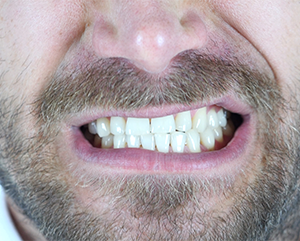
Teeth Grinding
The correct term for teeth grinding is Bruxism. The condition involves grinding teeth due to stress or anxiety. It can occur consciously or unconsciously.
One of the main consequences of Bruxism is abfraction. This causes the narrow grooves on the outside of the teeth at gum level to sometimes become sensitive to temperature changes. When Bruxism occurs, the teeth tend to flex side to side. Just imagine a nail hammered 2/3rds into a block of wood, it will move side to side. This is the same for when a tooth is embedded 2/3rds into the bone.
The movement of the tooth results in particles being released at the bone level. Over a period, horizontal stress fractures can occur which may even result in the tooth breaking off at the root. Here at Noosa Parade Dental, we have remedies for this depending on the circumstances. Come and see us or contact us for more information.
The risks of teeth grinding
Teeth grinding’ or Bruxism, brings with it a set of risks. These include:
- Muscular pain
- Headaches
- Tooth loss
- Shortening of teeth
- Tooth sensitivity
- Cracked or broken teeth
- Damage to the jaw joint
How to stop teeth grinding
Teeth grinding causes pain, damage and an altogether bleak situation. Fortunately, there are a few things that can be done to break the habit.
Relieve stress: Teeth grinding can sometimes be caused by stress and anxiety. Regular exercise has been shown to reduce stress and anxiety, minimising the root cause in some cases of teeth grinding. A walk or other mild exercise may help relieve some of the tension and stress that’s causing bruxism. Other methods such as meditation or seeking a stress management counsellor to help you gain some coping skills when it comes to situational anxiety and stressful situations. This can be helpful when it comes to getting to the root of the problem.
Be conscious of your habit: If you are a daytime clencher, it is important that you remain conscious of the habit. Try think of ways to remind yourself not to clench and to relax your jaw. You may wish to set a few reminders on your smartphone throughout the day to relax your muscles. Keep your lips sealed, but your teeth apart. Your teeth should be touching only when you’re chewing or swallowing. Drop your jaw and feel the muscles relax – then try to maintain that feeling.
Visit your dentist: if you are a night-time grinder, pay your dentist a visit. He/she may be able to recommend a nightguard. These nightguards are different to those worn during sport and are designed to prevent the negative effects of unconscious teeth grinding and clenching. There are two types of night guards: Custom nightguards made by your dentist and generic ones that can be purchased at the drug store. Custom nightguards are great as they are made to your specifications. They are often the smarter choice in protecting against bruxism because they account for your unique mouth shape and circumstances.
Generic night guards may fit less comfortably because they aren’t designed with your mouth in mind. Although, they shield the teeth from the worst of the night grinding.
If you suffer from bruxism, give Noosa Parade a call. We can remedy any damage caused as well as help provide you with a night guard to manage your condition.